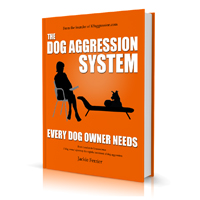Your cart is currently empty!
Controlling dog aggression by using a dog muzzle
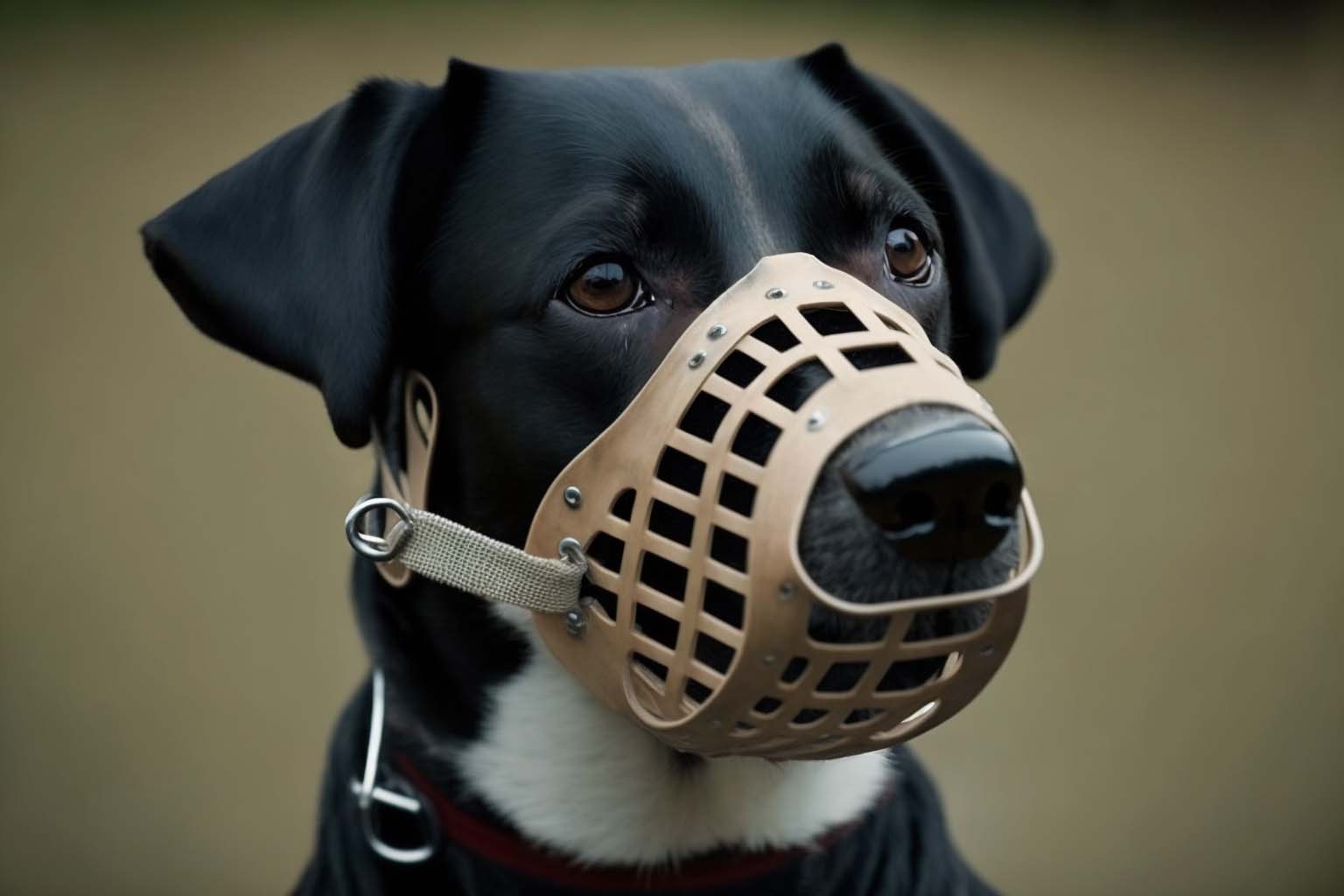
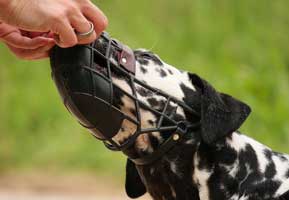
If it is possible your dog might bite, or your dog is aggressive, snarky or reactive, or if your dog is in a situation where they are in pain, you really should consider investing in and training your dog to wear a dog muzzle.
On the one hand, people can feel more confident when their dog is wearing a muzzle and this can help your dog stay calmer. However, while wearing a muzzle can prevent bites, it will not improve aggression and can potentially make aggression worse if misused.
In this article:
- What is the best muzzle for your situation?
- How to size and fit a muzzle.
- When to use a muzzle.
- Teaching your dog to wear a muzzle (very important).
- Do muzzles make aggression worse?
- Potential problems using a dog muzzle to stop biting.
- Alternatives to muzzles
1. What is the best muzzle for biting dogs
Finding the right muzzle can be challenging as there are a number of them on the market ranging in type and quality. Here is a rundown on the main types of muzzles available for biting dogs and how and when to use them. We also discuss which brands consistently get the best reviews by users to help you make a decision.
Please note, we’ve included links to Amazon that allows K9aggression.com to earn a small commission from Amazon for qualifying purchases, that goes towards our site hosting and maintenance costs if should you decide to buy. We have marked the links with an (#ad) so you can see these clearly. However, if you use a link to buy from Amazon, please make sure you are buying the correct size for your dog (see How to size and fit a muzzle.) . In addition, please don’t buy anything you don’t believe you need!
Occlusion Muzzle
- USES: Use occlusion muzzles short-term use only for vet visits or grooming

“Occlusion” muzzles that shut the dog’s mouth completely. They are usually made of fabric. Using a tight nylon muzzle may increase anxiety and fear (1). Never use an occlusion muzzles for long period of time. They may be fine for temporary use such as at the vet or grooming.
They should not be used for preventing barking. If your dog is barking excessively, it may be a result of boredom or there may be an anxiety issue that can be resolved. In this case you should consider getting a veterinary behaviorist consultation to diagnose the issue.
It is also possible that dogs can still nip if the can get their mouths at all open.
Dangers and considerations associated with occlusion muzzles
- Because dogs cool themselves when they are panting, these muzzles can pose a threat to the dogs wearing them. Avoid using Occlusion muzzles when especially warm or when they are stressed and need to pant. Panting is the only way a dog can cool down, so if worn too long in warmer weather, it can cause heat stroke resulting in serious harm or even death.
- Dogs can find occlusion muzzles extremely frustrating
Police style or “Agitation” dog muzzle
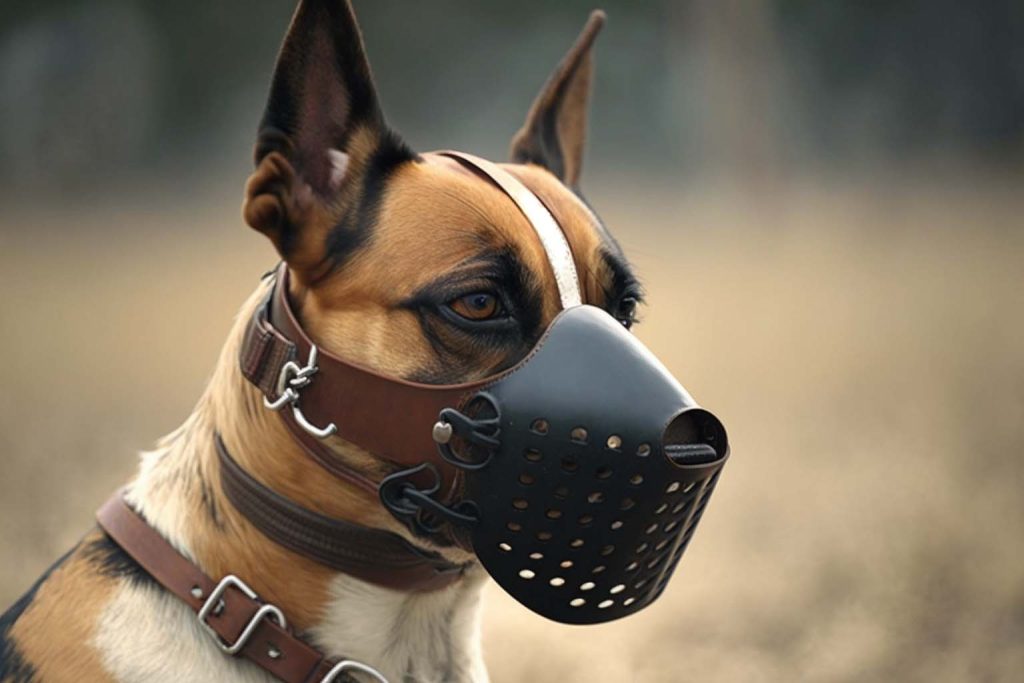

- USES: teaching dogs to bite for police or protection training
These dog muzzles are usually used for police or protection training where the dog is encouraged to bark and bite. They are usually made of leather, although plastic variations exist. The leather variations allow the handler or target of the aggression to experience less damage if they are hit hard with them. While leather agitation muzzles considered the safest from a bite perspective, they are also the most expensive.
You can see different types and prices on Amazon for “agitation training” muzzles #ad.
Dangers and considerations associated with Agitation muzzles
- Ventilation is still a concern with these muzzles. Examine how well ventilated the muzzle is that you are looking at.
- Getting the right fit is also important since it is more difficult to see how well the dog fits inside of it.
An important consideration is how easy you can feed treats through. Some muzzles will allow you to put a popsicle stick with peanut butter, spreadable cheese or pureed meat, but if you are using a muzzle with behavior modification or training, the ability to give a teat to your dog is essential. Some plastic muzzles can be cut through to make giving teats easier.
Basket Muzzles
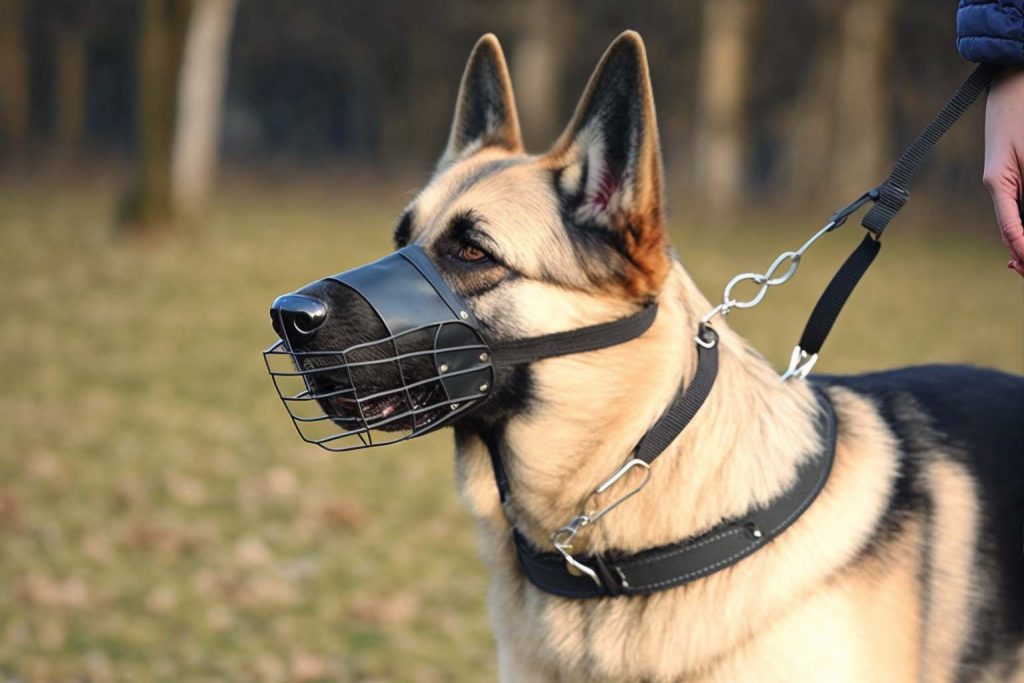
- USES: Bite prevention during longer-term use such as training or going on walks


For the average dog owner who wants to exercise caution while training their dogs not to be aggressive or out for walks, the basket muzzle the most humane choice recommended by veterinary behaviorists. The best muzzle to use in terms of minimizing anxiety and fear is a basket-type muzzle. (1) (2) It allows the dog to pant and open their mouths which is extremely important for any dog that is exercising, needs to wear one in warmer weather, or any dog who is panting because of stress.
Although there are many variations on the market you generally see either:
- Wire basket muzzles
- Plastic basket muzzles
- Softer variations usually made of some kind of fabric such as nylon.
Dangers and considerations with basket muzzles
- Some plastic muzzles tend to be cheaper, but they don’t tend to let in as much air flow so you need to consider what activity you are doing with your dog.
- Some dogs can get their lower jaw out and get teeth stuck.
- Dogs may be able to bite through a soft or cheap plastic muzzle.
Which Type of Muzzle is Best For Your Dog?
This leaves the wire basket muzzle or one of the better quality plastic ones as the better choice for reactive or aggressive dogs. The air flow is best with a wire basket muzzles. The ability to give your dog a treat through the muzzle is a little easier, too. However, the wire muzzles tend to be a little heavier and dogs can still hurt others with by hitting them with the muzzle.
Cut a hole at the front of plastic muzzles to make a larger hole to give them treats through the muzzle.
“Cute” of “Funny” Muzzles

The idea is great, but sadly, they are only good for short-term situations where the dog is unlikely to pant. Like the occlusion muzzles, they may be fine for temporary use such as at the vet or grooming.
Dangers and considerations with cute/funny duckbill muzzles
- If the temperatures are warm, or a dog is likely to be anxious, they should be avoided. Do not use these muzzles for walking or any situation where a dog needs to pant.
- the cute concept may encourage kids to approach.
- Many have reported that these muzzles are too easy for the dog to pull off.
Choosing a brand
How we decided
- Reviewed and consulted veterinary behaviorist advice
- Collected online data from experienced dog owners and personal experience
- Long standing brand ensures products need to live up to brand reputation
- Because Amazon is the world’s largest and most trusted retailer, cross-checked against Amazon selling ranks, ratings, number of reviews and quality of reviews over time
Muzzles ranked highest
Jafco
Jafco Muzzles are the first choice of some veterinary behaviorists and many training professionals. (1)

Jafco Muzzles (#ad) are high quality muzzles. Many Veterinary Universities such as PennVet Behavior Medicine Clinic uses Jafco muzzles at their hospital (1) as well as other training professionals. These are plastic muzzles that have some flexibility to them so if the dog hits you with one, it doesn’t hurt as much as the wire ones.
Dean and Tyler
Consistently the Dean and Tyler brand wire basket muzzles on Amazon (#ad) received excellent reports for quality and value. (We have no affiliation with any brand, it is simply the result of our research). Once bought you should never need to buy one again.
The Dean and Tyler brands have good fitting guides on their site, and you can usually find them for less on Amazon than buying direct (we have heard from at least one person that buying direct did not go smoothly, but that may have been a one-off situation).

The DT Freedom Muzzle (#ad) is their most spacious basket muzzle and has received excellent reviews and is suitable for medium to extra-large dogs. Dead and Tyler has a “winter” version which is the wire covered with rubber These dog muzzles are good for those living in colder climates. These muzzles allow your dog to drink and take treats as well allow a wide range of jaw movement.

The DT Muzzle (#ad) is good for small (Yorkshire terrier size), up to larger dogs such as big Schnauzers, Bouviers, etc. These muzzles allow your dog to drink and take treats. You will need to check the sizes for your dog. They come in many more sizes than the Baskerville.
Basketville Ultra Muzzles
Baskerville Ultra Muzzles (#ad) (look for the size that fits your dog- this one links to a size 5!) also scored well for dogs with larger heads.

Baskerville Ultra Muzzle (#ad) (look for the size that fits your dog – this one links to a size 5) is not a wire muzzle but is another option although primarily designed for wide-headed dogs such as Staffordshire Bull Terriers, pitbulls, etc.

It has received good reviews and you can buy them for less than the Dean and Tyler and Jafco muzzles.
The advantage of this muzzle is that the rubber version is typically lighter than the wire basket muzzles. It is easy to feed treats through.
The downside is that it has been reported to rub the skin against the nose of some dogs and there is a slightly more restricted airflow than the wire basket muzzles. They come in about 6 different sizes.
SEE ALSO: 6 other ways to keep others away from your dog
2. Size and fit considerations

Most muzzles are adjustable. However, dogs come in all sorts of different shapes and sizes, even between breeds. What works for a greyhound with a narrow head is not going to work for a pitbull type with a wide jaw. Therefor you might want to build in your budget additional shipping costs in case you need to return a muzzle if it does not fit properly.
The strap around the neck needs to fit quite snuggly so the dog cannot paw it off or catch it on anything. Ensure that there is enough room in the basket part of the muzzle for your dog to pant.
Make sure that the muzzle is not too small, but also that it is not too big. You may think you are doing your dog a favour by giving them lots of room, but you might actually be causing more problems if the muzzle is loose, flops around or rubs unnecessarily.
Desensitized and counter condition dogs to wearing a muzzle in order to make it a pleasurable experience. You don’t want a frustrated or irritated dog. You will feel better about your dog wearing one as well!
3. When to use a dog muzzle

Vet visits
Vet visits can be stressful to dogs for a number of reasons and bites are more likely to happen. However check with your vet about whether they think muzzling your dog is a good idea during the visit. If your dog is aggressive to other animals, it might be possible to keep your dog in your vehicle until the vet is ready to see your dog.
Neighbourhood or park walks
If your dog has the potential to bite, safety should always come first. The first step it to prevent your dog from becoming anxious by avoiding the things that set them off. But surprises and accidents happen so make sure your dog can’t bite by using a muzzle. It is a good idea to reinforce the link between muzzles and enjoyable walks
During training or behaviour modification
You should avoid the things that trigger your dog’s aggression except when doing behavior modification. However do not trigger the aggression by getting too close – see the importance of getting your dog’s attention at the first sign of arousal. Use a dog muzzle only as a safety precaution only.
To help encourage people to keep their distance
Muzzles encourage people to keep their distance! If you are interested in keeping people at a distance check out our article on other things that can help keep people and or dogs at a distance.
To regain your confidence
If you have experienced an aggressive conflict you may be feeling anxious yourself. Dogs can pick up on that and become more anxious in response. Knowing that your dog can’t bite might help you feel calmer.
4. Teaching your dog to wear a muzzle
- Train your dog to enjoy wearing a muzzle (see video below)
- Start for short periods and gradually work up to longer periods.
- Put the muzzle on even when he or she doesn’t need it from time to time so they don’t associate with the trigger of their aggression.
Here is a pdf describing how to desensitize your dog to wearing a muzzle or head halter that describes how you can do this. However, forcing a dog to wear a dog muzzle for too long can also be frustrating for them and this can contribute to stress.
Here is a link to an excellent video showing you how to train your dog to wear a muzzle
Treat suggestions to use with muzzles
- “Squeezy” cheese or Canned aerosol cheese
- baby food
- liverwurst
- Pretzels sticks
- Kibble
- “long” treats
- Peanut butter, spreadable cheese or meat on a stick
- Pureed dog food
You may want to use a reusable and refillable dog training food tube (#ad) and use a blender to puree your dog’s food to put into it. Kong Stuff’n products (#ad) that come in a variety of food types (such as peanut butter, sweet potato) are another good alternative for those people who don’t have the time. We’ve linked to a variety bundle but check out all the options.
Working with non-food motivated dogs
Some dogs are picky. This is sometimes causes by stress. Other time, they are simply fed enough and lack the interest in eating more. Here are some tips:
- Feed your dog less at meals
- Use only high quality and desired food – kibble is rarely motivating for dogs
- Ensure their diet is not causing them to feel uncomfortable. Some prepared raw diets, for example, do not puree vegetables well enough and may cause digestive upset
- Talk to your vet about food allergies
Another helpful video on teaching your dog to wear a muzzle
How to handle dog aggression
Dog muzzles can be used to control biting. They should be used whenever there is any risk that a bite could happen.
Outside of fitting your dog properly, there is no special operating is there is with head halters. If your dog has the tendency to lunge, you might want to consider a head halter. (#ad)
Muzzles do not treat your dog’s aggression or reactivity in any way. If you continue expose your dog to the situations that make them aggression, you are making the aggression issue worse. If a muzzle strap were to break or the muzzle get pawed off, you still have a dangerous dog on your hands.
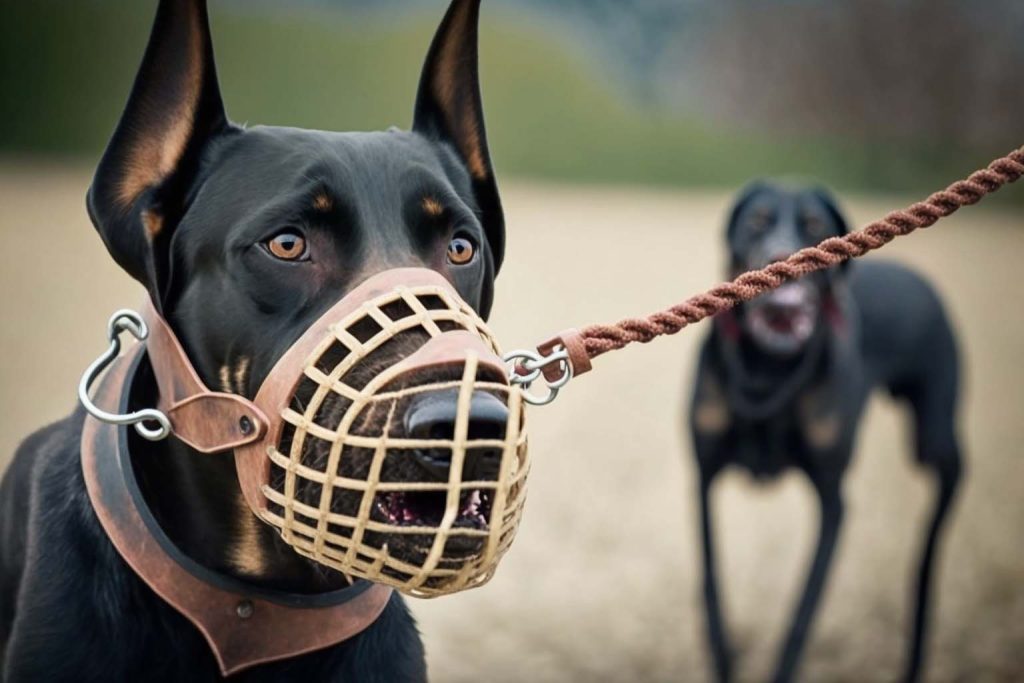
You are far better off making your dog a safer pet with a systematic approach than relying on a muzzle only. Here are some basic steps:
- Learn how to identify signs of stress or anxiety to help you act before the aggression even starts.
- Create a prevention and management plan to help you avoid the circumstances that are causing the aggression.
- Set up his or her life in such a way to passively improve the aggression (although these benefits will likely be mild – at least the aggression won’t get worse).
- Help your dog learn to cope better with the thing that is triggering his aggression with a treatment plan designed to keep his anxiety below “threshold” through humane treatment methods.
Learn more about treating dog aggression check out the ebook The Dog Aggression System Every Dog Owner Needs.
5. Does using a muzzle make dog aggression worse?
Some people ask does muzzling an aggressive dog will make aggression worse? It’s always worth keeping in mind that any kind of frustration will make aggression worse. There are three concern areas where a muzzle can increase frustration.
- Frustration. Desensitize your dog to avoid frustrating your dog by taking the muzzle on and off
- Feel strange. The muzzle it can feel strange and bothersome until your dog gets used to it. Again, desensitizing your dog to wearing the muzzle goes a long way toward getting your dog comfortable.
- When the dog muzzle has been on too long. Never leave a dog muzzle on for long period of time.
If a dog can’t get a muzzle off and wants to, or it is bothers his or her face, you can increase frustration and frustration can make aggression worse. This is why you should always desensitize a dog to wearing one.
6. Problems associated with using dog muzzles to control dog aggression
There are a number of problems with using muzzles to control dog aggression. Here is what to consider:
- Using a muzzle can give people a false sense of security. A dog muzzle will not prevent aggressive behavior. A dog muzzle will only prevent a bite. Your dog can still “muzzle punch”, lunge, hit, trample, bruise, etc. Breeds at risk for having a eye popped out during a fight are those who have eyes stick out such as Pomeranians, French Bulldogs, Pugs, etc.
- People have the tendency to use a dog muzzle instead of avoiding the situation that causes the aggression. Exposing your dog to the things that trigger his or her aggression will cause your dog to be more stressed and dread the situation even more the next time, making the overall problem worse. If you want to learn more about treating dog aggression, you may want to get the The Dog Aggression System Every Dog Owner Needs book (comes in both print and an ebook version).
- Never leave a child alone with a dog, muzzled or not. A muzzled dog can still cause injuries, and a child can make poor choices. You risk in having your dog feel even worse about children and becoming a greater danger to them in the future.
- A head halter does not prevent biting, but may offer control much more control over lunging if you have your dog on leash. Combining the two has been done, but it is a lot of the face of the dog and may cause some frustration
The Use of Muzzles With Other Behavior Issues:
- People think a muzzle can be used to stop barking. This is a bad idea as it frustrates the dog. There are more effective ways to handle barking such as addressing or treating the reasons why your dog barks. (See Barking control for more information)
- People think they can prevent destruction in the home with a muzzles while they are away. Dogs destroy things either because they are bored or anxious. A dog should never be left unsupervised with a muzzle on. It can get caught on things. If the dog tries to paw it off, even its nails can get stuck. Dogs have been known to get their lower teeth caught with cheaper muzzles. In addition, a dog that feels the need to destroy something may find other ways to do it. It is better to treat separation anxiety than to try to prevent it with a muzzle.
7. Alternatives to Muzzles
Crates, fences. tethering (i.e. leashing a dog to yourself or to an anchor in the house), putting a dog in a room away from the trigger of his or her aggression and outright avoidance are all alternatives to using a muzzle as a way to control an aggressive dog. Care must be taken to ensure dogs don’t become frustrated or bored.
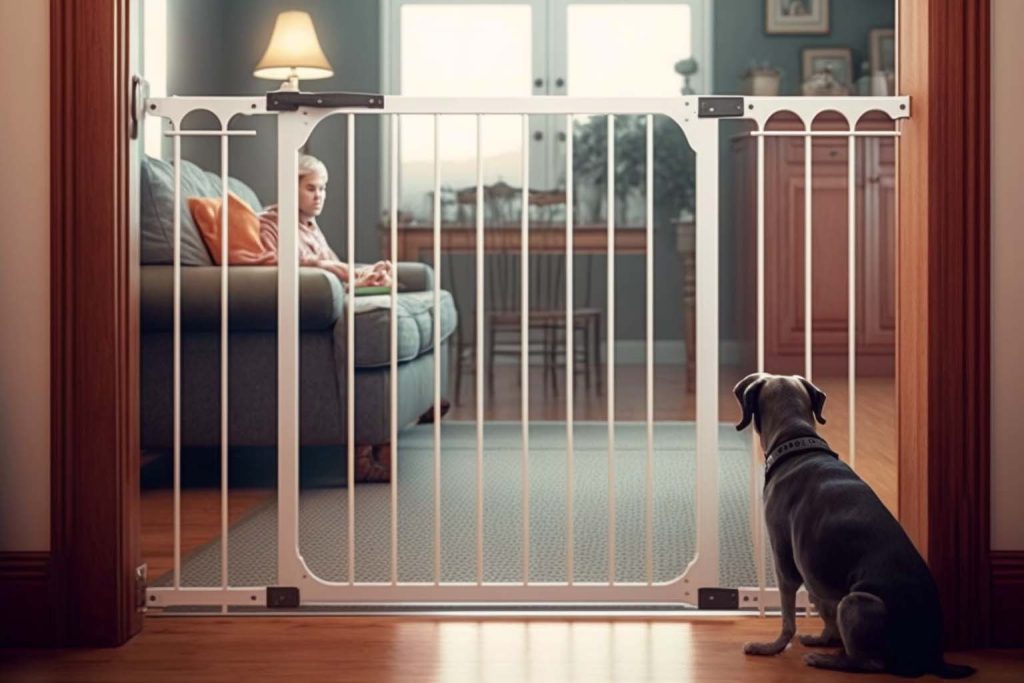
Care must be taken that the trigger of your dog’s aggression when using crates and tethering. Ensure the subject that triggers your dog’s aggression can not come so close that your dog becomes anxious. Otherwise there is a distinct possibility that your dog will feel trapped and this can make his or her aggressive response worse.
Fences can be a great help to separate your dog from others. We recommend a metal based gate for indoor use that is tall enough that your dog can’t jump it or get under.
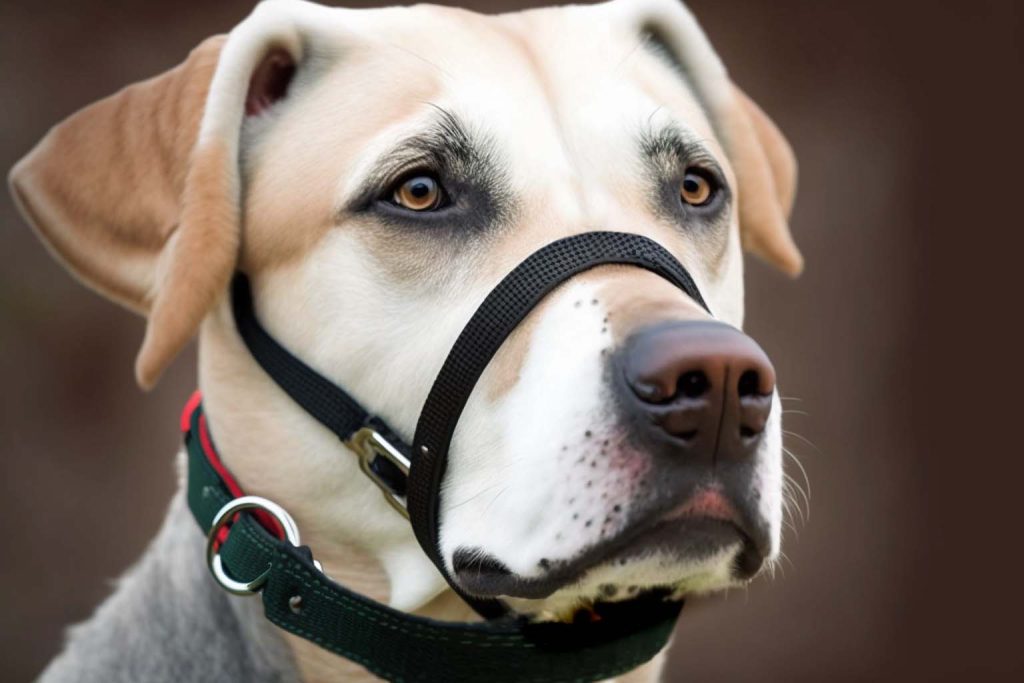
A head halter is another alternative for handling an aggressive or reactive dog. Head halters provide a lot of control over the head. While it’s possible for a dog to bite, you can also gently pull up on the head halter causing the mouth to close. You will need to desensitize your dog to wearing a head halter just as you would a muzzle. It’s far easier to direct his or her attention away from the thing they’re concerned about. Much easier than using a flat collar (do not use a choke, prong or e-collar on an aggressive dog – see 5 methods to avoid in dog training). This prevents your dog from practicing the aggression.
You might also be interested in
6 Other Ways to Keep Others Away From Your Dog
5 methods to avoid in dog training
Using a head halter for an aggressive dog
References
* Disclaimer: K9aggression.com is a participant in the Amazon Services LLC Associates Program, an affiliate advertising program designed to provide a means for sites to earn advertising fees by advertising and linking to amazon.com. That means we earn a small commission from any product listed here linked to Amazon should you decide to buy any of them on Amazon at no expense to you. This helps us keep our site up and maintained so we can continue to help people help their dogs. We never recommend anything that we don’t believe will be of value to you. Please do not by anything that you don’t need or feel is not useful.
ADVERTISEMENT
The Dog Aggression System Every Dog Owner Needs E-book
ADVERTISEMENT
Tags:

